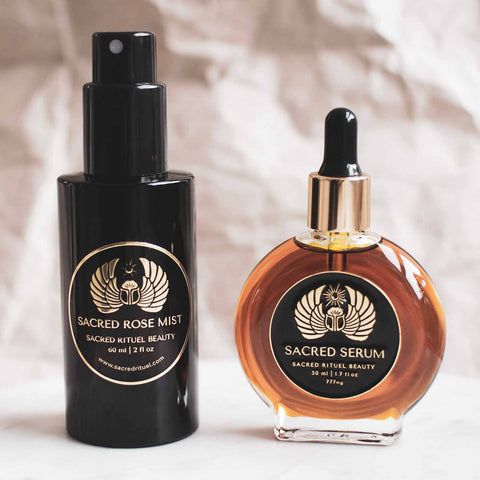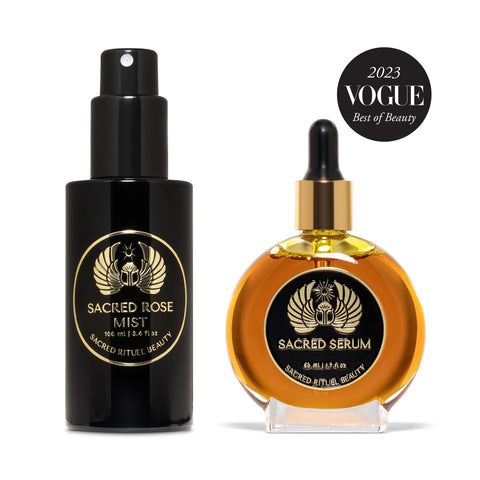Best Face Oil For Sensitive Skin
Key Takeaways:
- Ingredient Safety: Face oils for sensitive skin should be formulated without fragrances, harmful preservatives, or heavy oils to avoid irritation.
- Hydration and Soothing Effects: Quality face oils lock in moisture and soothe inflammation, aiding in skin health and reducing discomfort.
- Application Tips: For best results, apply face oil to clean, damp skin using a pressing motion, and adjust the application based on the time of day and seasonal changes.
Products formulated with Arnica to address reduce skin inflammation, bruising, and swelling.
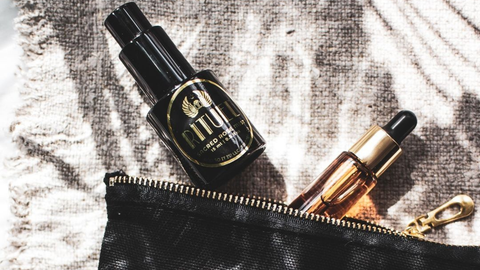
At Sacred Rituel Beauty, we take pride in being leaders in utilizing the world's most sacred and healing plants to create skincare products that are both effective and gentle for sensitive skin. Our dedication to clean, organic, and sustainably sourced ingredients ensures that you can trust our products to nourish and protect your skin without causing irritation.
This piece will discuss the distinct advantages of face oils designed for sensitive skin, explore the criteria for choosing the appropriate oil, and spotlight our top selections that offer hydration and a soothing effect. We invite you to follow our guidance as we assist you in selecting the ideal face oil to enhance your sensitive skincare routine, helping you maintain a radiant and healthy glow without any compromises.
Criteria For Choosing The Best Face Oil For Sensitive Skin
Ingredient Transparency
Our dedication to transparency means that we disclose every ingredient in our face oils clearly. This is especially important for individuals with sensitive skin, as it enables them to steer clear of components that may cause allergies or irritation. By offering a comprehensive list of ingredients, we empower our customers to make choices that are well-informed and tailored to their skin's specific requirements.
Organic And Sustainable Sourcing
We prioritize the use of organic ingredients that are sustainably sourced, reflecting our commitment to both skin health and environmental stewardship. Our stringent sourcing standards help ensure that the botanicals in our oils are pure, effective, and free from harmful chemicals, which is particularly important for sensitive skin that reacts easily to less natural additives.
Anti-Inflammatory Properties
The carefully selected ingredients in our face oils, such as chamomile and calendula, are renowned for their anti-inflammatory properties. These natural components work to soothe and calm irritated skin, reducing redness and discomfort, which is a common concern for those with sensitive skin. The gentle action of these ingredients makes our oils a safe choice for maintaining skin health.
Non-Comedogenic Formula
Our face oils are designed to be non-comedogenic, meaning they moisturize deeply without clogging pores or causing acne flare-ups. This feature is essential for sensitive skin types, which may be more prone to breakouts and irritation from heavier, oil-based products. Our lightweight formulas provide essential hydration and protection without the risk of aggravating the skin.
Patch Testing And Clinical Trials
Each of our face oils undergoes rigorous patch testing and clinical trials to ensure they are safe for sensitive skin. This meticulous testing process is part of our commitment to quality and customer satisfaction, providing assurance that our products meet high standards of safety and effectiveness. These evaluations help identify any potential for irritation, ensuring that our oils are gentle yet beneficial.
Benefits Of Using Face Oil For Sensitive Skin
Hydration And Moisture Retention
Sensitive skin requires careful management to maintain hydration, which is crucial for its health and resilience. Face oils are particularly effective at sealing in moisture, creating a barrier that minimizes water loss and protects against harsh environmental conditions. This layer not only keeps skin hydrated but also makes it less susceptible to irritations caused by dryness. Regular use of face oils can lead to long-lasting hydration, keeping your skin soft and plump.
Nutrient-Rich Nourishment
The concentrated nature of face oils means they are packed with vital nutrients that sensitive skin might otherwise lack. These oils deliver a powerful dose of antioxidants and vitamins directly to your skin, aiding in its natural repair processes and combating oxidative stress. Such nutrients are essential for the regeneration of skin cells and help fortify the skin's defenses against daily aggressors. Over time, this leads to a stronger, healthier skin barrier that is less reactive to irritants.
Soothing Inflammation
One of the most appreciated benefits of face oils for sensitive skin is their ability to soothe inflammation and reduce redness. Ingredients like chamomile, lavender, and rosehip have natural anti-inflammatory properties that calm skin flare-ups and soothe discomfort. This is particularly beneficial for skin conditions such as rosacea or eczema, where inflammation is a frequent issue. Regular application of these soothing oils can help manage symptoms and maintain a more consistent skin appearance.
Enhanced Skin Texture And Tone
Using face oils consistently can dramatically improve the overall texture and tone of sensitive skin. They work to even out skin tone, soften texture irregularities, and promote a radiant glow. Beyond cosmetic improvements, these oils support skin health by enhancing elasticity and reducing the visibility of fine lines and scars. The result is a smoother, more youthful complexion that looks healthy and vibrant.
Top Picks For Face Oils Suitable For Sensitive Skin
- Organic Chamomile Blend Oil: Perfect for soothing and calming the skin, this oil leverages the natural anti-inflammatory properties of chamomile to reduce redness and irritation.
- Rosehip Seed Oil: Known for its healing properties, rosehip seed oil helps to repair damaged skin barriers, promote regeneration, and improve skin texture and tone.
- Calendula Infused Oil: Excellent for extremely sensitive skin, calendula oil offers gentle soothing effects, helps in healing minor skin irritations, and maintains the skin's hydration.
- Squalane Oil: Derived from olives, squalane is a lightweight, non-comedogenic oil that mimics the skin's natural oils, providing hydration without clogging pores or causing breakouts.
How To Integrate Face Oils Into Your Skincare Routine
Start With A Clean Base
For optimal results, face oils should be applied to clean and slightly damp skin. This ensures that the oil penetrates effectively, utilizing the moisture on the skin to lock in hydration. Begin by cleansing your face to remove impurities and then lightly pat your skin with a towel just enough to leave it damp.
Apply The Right Amount
Using the correct amount of face oil is crucial—typically, just 2-3 drops are enough. Warm the oil between your palms before gently pressing it into your skin, rather than rubbing it, which can cause irritation. This method helps the oil distribute evenly without overloading the skin.
Layer Properly
It's essential to layer your skincare products correctly. After applying any water-based treatments, such as serums, gently apply your face oil. If you use a moisturizer, it should come after the oil to seal in all the benefits of the previous products. This step is critical for maintaining the effectiveness of each product in your routine.
Use At The Best Time
Consider the timing of applying face oil to maximize its benefits. Evening application is often recommended because it supports the skin’s natural overnight healing process. However, if your skin feels particularly dry, a morning application can also be beneficial, providing a protective layer against environmental stressors throughout the day.
Common Irritants To Avoid In Face Oils For Sensitive Skin
Fragrances And Perfumes
Synthetic fragrances are major culprits in triggering skin irritation and allergic reactions. For sensitive skin, it is crucial to choose face oils that are either completely free of fragrance or only contain natural essential oils that serve both a therapeutic and aromatic purpose. These natural alternatives are less likely to cause irritation and can provide additional skin benefits such as calming and soothing effects.
Preservatives
Common preservatives like parabens, phenoxyethanol, and formaldehyde-releasers are often linked to skin sensitivities and allergic reactions. It's advisable to seek out face oils with natural or minimal preservative systems that reduce potential irritation. This might mean shorter shelf lives but a safer application for sensitive skin.
Sulfates
Although primarily found in cleansers and shampoos, any residual sulfates in skincare products can disrupt the skin's natural oil balance, leading to irritation and dryness. Ensuring that your face oils and other skincare products are sulfate-free can help maintain skin integrity and prevent irritation.
Alcohols
Not all alcohols are detrimental, but simple alcohols like ethanol or isopropyl alcohol can be very drying and irritating to the skin. Look for face oils that use fatty alcohols, which are emollient, or avoid alcohols altogether to ensure the oil nourishes without stripping moisture or causing irritation.
Seasonal Considerations For Face Oils
Winter Care
During cold, dry months, a richer, more protective oil can help combat increased dryness and irritation. Ingredients like shea butter and heavier oils like marula or avocado oil provide extra moisture and form a protective barrier against harsh winter air.
Summer Lightness
In warmer, humid months, lighter oils like jojoba or squalane are preferable as they absorb quickly without leaving a greasy residue. These oils help maintain hydration without exacerbating sweat and sebum production.
Spring And Autumn Adjustments
Transitional seasons might require a balanced approach, adapting to the day's weather. Switching between a lighter oil during a warm day and a slightly richer one during a cooler, windy day can help maintain skin's comfort.
UV Protection Enhancement
Regardless of the season, always complement your face oil regimen with a broad-spectrum sunscreen to protect sensitive skin from UV damage. Some face oils can contain natural SPF boosters like carrot seed oil, but they should not replace sunscreen.
Read also:
- Managing Acne-Prone Skin: Expert Advice And Solutions
- The Ultimate Guide To Skincare For Sensitive Skin
- Calendula: The Natural Wonder Ingredient In Skincare
Frequently Asked Questions About Best Face Oil For Sensitive Skin
What are the benefits of using face oil for sensitive skin?
Face oils help to lock in moisture and protect the skin from environmental irritants. They are particularly beneficial for improving skin resilience and reducing sensitivity over time. Regular use can lead to a more hydrated and less irritated complexion.
How do I choose the right face oil for sensitive skin?
Select face oils that are free from synthetic fragrances, preservatives, and non-comedogenic ingredients. Oils rich in natural anti-inflammatory agents like chamomile or rosehip are ideal. It's also important to choose products with clear ingredient transparency to avoid allergens.
Can face oils cause breakouts on sensitive skin?
Non-comedogenic face oils are specifically formulated to moisturize without clogging pores. However, it's crucial to choose oils suitable for your skin type to avoid triggering breakouts. Regular patch testing can help determine if a specific oil is right for you.
What ingredients should I look for in a face oil for sensitive skin?
Look for soothing ingredients like chamomile, calendula, and squalane in face oils. These ingredients help calm irritation and provide essential hydration. Avoid oils with ingredients that are known to cause irritation or allergic reactions.
How often should I apply face oil if I have sensitive skin?
Typically, applying face oil once in the morning and once at night is beneficial. Adjust the frequency based on how your skin reacts and the specific needs during different seasons. Always listen to your skin’s response and modify usage accordingly.
Are there face oils that should be avoided for sensitive skin?
Avoid face oils containing synthetic fragrances, alcohol, or heavy mineral oils, which can irritate sensitive skin. Oils with aggressive chemical additives or preservatives should also be avoided. Opt for natural, gentle formulations designed specifically for sensitive skin.
Can I use face oil under makeup?
Yes, a lightweight face oil can serve as a hydrating base under makeup. Apply a small amount and allow it to absorb fully before applying makeup to ensure a smooth application. This can help prevent the makeup from drying out your skin throughout the day.
Is there a difference in face oils for day and night use?
Daytime oils should be lighter and absorb quickly to not leave a greasy feel under makeup or attract pollutants. Nighttime oils can be richer, supporting the skin's natural repair process while you sleep. Adjusting the type of oil you use can optimize skin benefits around the clock.
How should I apply face oil to my sensitive skin?
Start with clean, slightly damp skin to maximize absorption. Warm a few drops of the oil in your palms and gently press it into your skin, avoiding rubbing. This method helps distribute the oil evenly without irritating the skin.
What are the signs that face oil is not suitable for my sensitive skin?
If using a new face oil leads to increased redness, itching, or breakouts, it may not be suitable for your skin. Discontinue use if symptoms persist or worsen. Always conduct a patch test before fully integrating a new oil into your skincare routine.


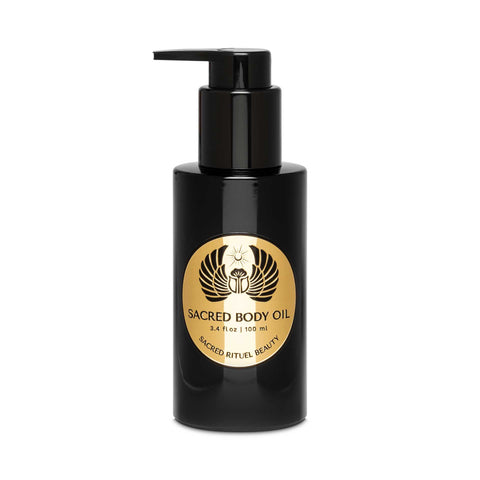
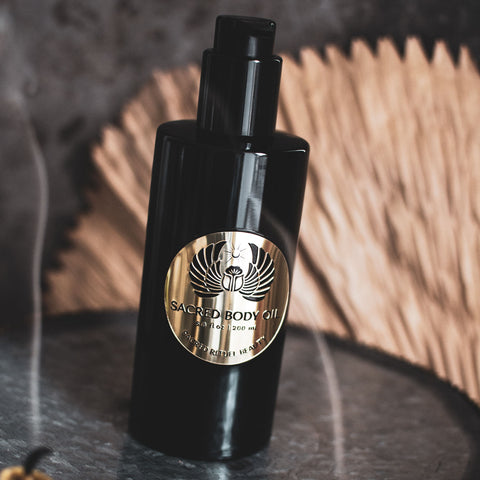
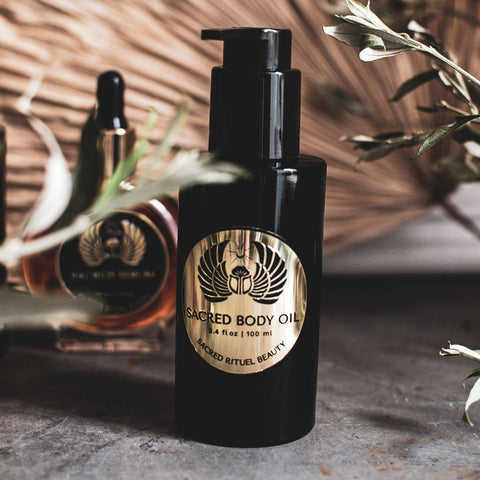

All Day Glow Essentials
Free Shipping on orders over $90
FREE Shipping on orders over $90 and $7 flat rate on all other orders (USA).
See our shipping policy.
Auto Delivery w/ a Subscription
Ensure you ALWAYS have a steady stream of SACRED RITUEL on hand!
Details in our subscriptions page.
No Hassle 30-day Returns
Try SACRED RITUEL for 30 days and send it back for a full refund if it doesn't completely meet your expectations.
Details in our return policy.
SACRED RITUEL is
High potency all organic skincare
Newsletter
Stay connected on wellness tips, exclusive sales and events!

